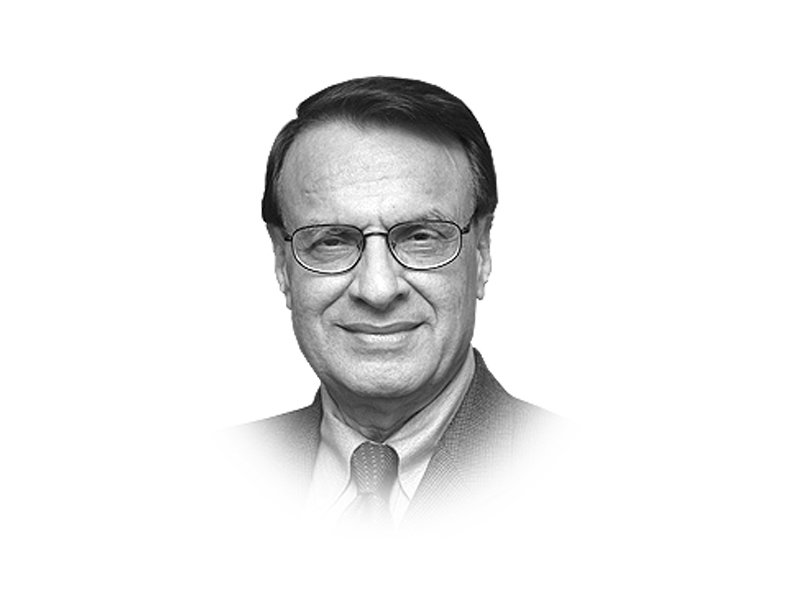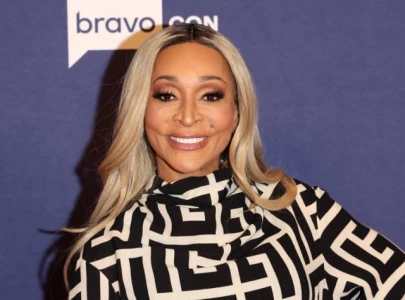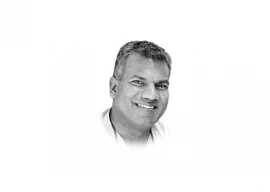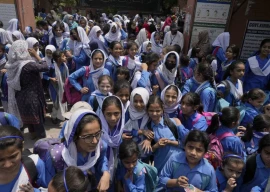
The gender gaps will be closed only with concrete and sustained actions backed by the requisite allocation of resources to promote literacy and basic health services for women in Pakistan, especially those in rural and backward areas. Instead of indulging in diversionary antics, which at times may be inconsistent with our religious and cultural value system, we need to focus more on coherent and concrete legal reforms, even if we have to resort to reversing some of the existing policies and laws.
It is the responsibility of the government and parliament to do so. But both remain averse to any systemic change that weakens their deeply-entrenched elitist power structure and have instead created distortions in our political system to further reinforce the status quo of power and privilege. Reserving seats for women in our elected assemblies and filling them by nomination is one of those distortions that need to be revisited sooner rather than later.
In recent years, no doubt, there has been a conspicuous increase in the number of women in our political institutions but merely showcasing the presence of a few privileged and heavily painted females with designer outfits in our cabinets or legislative chambers is neither gender-mainstreaming nor empowering of women. They only aggravate the already acute sense of socio-economic deprivation. We should be applying our energies and resources to plugging the gender gaps in education, health and employment. It is in these critical areas that Pakistani women need to be included in the mainstream.
Last week, we saw television screens depicting our newly-inducted women assembly members as fashion models” loaded with glitzy outfits and expensive jewellry. That has never been a scene in the world’s genuine democracies where assembly sessions or cabinet meetings are not the place for women members to try out the latest designs or expensive outfits. The problem with our elitist female politicians is that they don’t understand the importance of their high office and the dignity attached to it. Their presence in assemblies or cabinets laden with expensive jewellery, designer outfits or fashion accessories, is of no value to women’s causes.
In our privilege-based political system, women mostly come into political limelight riding only on their ancestry or political influence and connection, and are inevitably tempted to brandish their affluence while in public gaze. Most of them are there not because they are qualified to be in that position but only because of the flawed system of election to the seats reserved for women. The system itself smacks of discriminatory gender inequality.
What they should realise is that as nominated legislators or public offices holders of an impoverished country, they ought to be presenting themselves as an example of austerity and simplicity, eschewing, at least in public, their ostentatious and lavish lifestyle. Their work attire has to be different from their social party dress. They say clothes make the man but it’s true for women, too! One’s choice of clothing speaks volumes about his or her personality. In every profession, certain propriety is attached to work dress for both men and women.
In some cases, for work attire to ensure dignity and civility there are universal don’ts common to all societies, Oriental or Western. But in our case, there are no such rules or guidelines. To be honest, we don’t need any rules on what and how to dress up for work. We just have to be mindful of our own socio-cultural limits. In some cases, like doctors, teachers, lawyers and judges when at work, white or black gowns are customary.
Our ministers and public office-holders including parliamentarians don’t have to wear uniforms or gowns but, as is the practice all over the world, they must be in decent and simple attire while at work in public life, assembly sessions or cabinet meetings. To be fair to themselves and to their high office, they must give a touch of sobriety to their person. Appropriate attire is certainly more demanding for women than men due to unwritten cultural limits and wider variety of clothing available with fast changing fashions almost in every season.
While men can do with any neat and clean shalwar kameez with a waistcoat or a business suit, women’s clothing in public life and in the business community has to be carefully selected to match the nature of occasion and, as a rule, it also has to be simple and decent. A public figure has to look different from a showbiz personality. If you are a minister, you should be even more circumspect in your public attire. A conservative and neat look has to be of primary importance. Fashion is only secondary.
In Pakistan, we have had an array of political icons from Fatima Jinnah to Benazir Bhutto and lately, the outgoing speaker, Fehmida Mirza, but none of them was ever seen making a fashion statement. Political leaders, male or female, ought to be making political statements. In order to remain elegant and sophisticated, they must avoid overstated looks or extravagance. As public figures, they must exemplify the culture and national dignity that they represent.
For others, surely, there are no holds barred. Anyone who has the means for costly outfit and fashion accessories can wear them at his or her will. No one has ever questioned how our showbiz ladies or fashion models dress up or what accessories they wear to look smart. As long as one can afford, it is nobody’s business to gripe over anyone’s clothing or personal look. That is a right available to all, with known limits of decency and public propriety.
Published in The Express Tribune, June 8th, 2013.
Like Opinion & Editorial on Facebook, follow @ETOpEd on Twitter to receive all updates on all our daily pieces.
COMMENTS (12)
Comments are moderated and generally will be posted if they are on-topic and not abusive.
For more information, please see our Comments FAQ

1734600943-0/Untitled-(64)1734600943-0-165x106.webp)
1734602586-0/Bobbi-Althoff--(1)1734602586-0-165x106.webp)
1721377568-0/BeFunky-collage-(18)1721377568-0-165x106.webp)
1734599322-0/Untitled-(61)1734599322-0-165x106.webp)






1734468458-0/Copy-of-Untitled-(50)1734468458-0-270x192.webp)

1734511806-0/Untitled-design-(5)1734511806-0-270x192.webp)





I see some of my fellow readers here getting ticked off that this is a jab against women. I think you guys are missing the point then. Read the first sentence" of the article and you shall see that its about how the majority of women in Pakistan are NOT being helped or advantaged by "pigs in lipstick" prancing around Islamabad:
"Despite the relative privilege of some elitist women, the majority of women in Pakistan remain structurally disadvantaged as a result of our discriminatory legal system and obscurant norms and attitudes. There are systemic, almost insurmountable barriers to women’s genuine empowerment."
@Zara - Not sure i got the same meaning from this article. his precise point is that for a country with 80% load shedding and extreme economic issues, our "unelected" politicians are demonstrating " their ostentatious and lavish lifestyle.". forget if that lifestyle came from legit means or not (i doubt it). the purpose here is that 1)these women have not been elected so they dont represent the real people of their jurisdictions and 2) their behavior and representation in public says alot about their focus in the public sector. Simplicity and austerity is not a male dominated perspective by this writer. in my opinion, and if you read his past articles, he is really commenting on the process or lack thereof to represent our country's dire economic crisis.
Making a fashion statement and a political statement are not necessarily mutually exclusive. I think it is plain disgusting when people cannot or do not want to see beyond a woman's clothing. Grow up.
i don't believe that a female politician with expensive jewellery is any different from a male one with property worth crores. neither's presence is valueable to humanity over all.
I wonder why the writer chose this subject at a time such as the present when he could have made much better use of his talents to talk about our foreign policy instead. Women are known to bring colour and cheer to many a desolate situation, and why should he grudge that? Is not a woman, any woman, the happiest when well dressed and bejeweled? Men should go out of their way to keep women happy and proud of themselves.
This Op Ed is like a person giving lecture on how to raise kids while never having kids. This task and minute details are better left for a woman writer. He writes "Reserving seats for women in our elected assemblies and filling them by nomination is one of those distortions that need to be revisited". I am all for direct elections of women and men. Having said that we live in a country where most women in many areas of KPK and Baluchistan are not even allowed to vote or go out of their own will. In addition most parties especially rightwing do not award more than a few women party tickets. Let us take the case of new open minded PTI. They would rather lose an old leader like Fouzia K but not award her ticket on even one of the seats vacated by party men. The case of JI and JUI is even worse. In short is we do not have reserve seats then women have no chance. Even if only elitist women come to the assemblies but they might inspire like the elitist ZAB, IK and BB had inspired. The first day in the NA cannot be compared to a regular day of work. It is sad but most Pakistani women in any large gathering would be over dressed especially if it is going to be televised! It is not women but our male dominated culture that gives rise to this attitude. A better solution would be to have 30-50% of seats reserved for women no matter how few votes they get.
It is only in Pakistan that seats are reserved for women in the Parliament,but no where else in the world,yet they are called public representatives when they come to Assemblies by selection & not through popular votes of the public.They must contest elections if want to do politicking in the country & claim equal rights.But,there are a few ladies who prefer to contest elections & win against men contestants.........Three cheers for them!!!!
Working women all over the world are without make up while at work.In our country it is other way round.In particular lady parliamentarians,with due deference to all of them,are over made up to the extent that they look like pieces of pastries,leave aside their designer's dresses as if they have come to appear in fashion shows.Now,the protocol is that national flag on cars of those who are entitled to it is covered after sunset,but if these ministers & others do that then how would a common man know that a dignitary is coming.Mr.shamshad Ahmed was our ambassador,permanent representative in the UN & the foreign secretary,who knows such protocols better than him.A seasoned diplomat & an intellectual in his own right!! Good piece!!
It is an amazing op-ed by a former ambassador to the UN and a former foreign secretary of Pakistan. Looks like a grandpa giving advice to the ladies how they should get dressed depending upon their profession and of course 'within the limits of decency'.
Great piece, but regarding what you wrote about the reserved seats, don't you think reserving seats actually ensures a substantial number of women in the assemblies? I don't think reserving seats is in any way discriminatory.